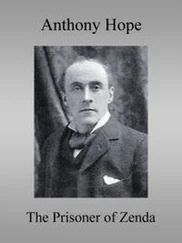“Many a man has cursed their red hair before now,” muttered the old lady—and I remembered James, fifth Earl of Burlesdon.
“But never a woman!” cried the girl.
“Ay, and women, when it was too late,” was the stern answer, reducing the girl to silence and blushes.
“How comes the King here?” I asked, to break an embarrassed silence. “It is the duke’s land here, you say.”
“The duke invited him, sir, to rest here till Wednesday. The duke is at Strelsau, preparing the King’s reception.”
“Then they’re friends?”
“None better,” said the old lady.
But my rosy damsel tossed her head again; she was not to be repressed for long, and she broke out again:
“Ay, they love one another as men do who want the same place and the same wife!”
The old woman glowered; but the last words pricked my curiosity, and I interposed before she could begin scolding:
“What, the same wife, too! How’s that, young lady?”
“All the world knows that Black Michael—well then, mother, the duke—would give his soul to marry his cousin, the Princess Flavia, and that she is to be the queen.”
“Upon my word,” said I, “I begin to be sorry for your duke. But if a man will be a younger son, why he must take what the elder leaves, and be as thankful to God as he can;” and, thinking of myself, I shrugged my shoulders and laughed. And then I thought also of Antoinette de Mauban and her journey to Strelsau.
“It’s little dealing Black Michael has with—” began the girl, braving her mother’s anger; but as she spoke a heavy step sounded on the floor, and a gruff voice asked in a threatening tone:
“Who talks of ‘Black Michael’ in his Highness’s own burgh?”
The girl gave a little shriek, half of fright—half, I think, of amusement.
“You’ll not tell of me, Johann?” she said.
“See where your chatter leads,” said the old lady.
The man who had spoken came forward.
“We have company, Johann,” said my hostess, and the fellow plucked off his cap. A moment later he saw me, and, to my amazement, he started back a step, as though he had seen something wonderful.
“What ails you, Johann?” asked the elder girl. “This is a gentleman on his travels, come to see the coronation.”
The man had recovered himself, but he was staring at me with an intense, searching, almost fierce glance.
“Good evening to you,” said I.
“Good evening, sir,” he muttered, still scrutinizing me, and the merry girl began to laugh as she called—
“See, Johann, it is the colour you love! He started to see your hair, sir. It’s not the colour we see most of here in Zenda.”
“I crave your pardon, sir,” stammered the fellow, with puzzled eyes. “I expected to see no one.”
“Give him a glass to drink my health in; and I’ll bid you good night, and thanks to you, ladies, for your courtesy and pleasant conversation.”
So speaking, I rose to my feet, and with a slight bow turned to the door. The young girl ran to light me on the way, and the man fell back to let me pass, his eyes still fixed on me. The moment I was by, he started a step forward, asking:
“Pray, sir, do you know our King?”
“I never saw him,” said I. “I hope to do so on Wednesday.”
He said no more, but I felt his eyes following me till the door closed behind me. My saucy conductor, looking over her shoulder at me as she preceded me upstairs, said:
“There’s no pleasing Master Johann for one of your colour, sir.”
“He prefers yours, maybe?” I suggested.
“I meant, sir, in a man,” she answered, with a coquettish glance.
“What,” asked I, taking hold of the other side of the candlestick, “does colour matter in a man?”
“Nay, but I love yours—it’s the Elphberg red.”
“Colour in a man,” said I, “is a matter of no more moment than that!”—and I gave her something of no value.
“God send the kitchen door be shut!” said she.
“Amen!” said I, and left her.
In fact, however, as I now know, colour is sometimes of considerable moment to a man.
CHAPTER 3
A Merry Evening with a Distant Relative
I was not so unreasonable as to be prejudiced against the duke’s keeper because he disliked my complexion; and if I had been, his most civil and obliging conduct (as it seemed to me to be) next morning would have disarmed me. Hearing that I was bound for Strelsau, he came to see me while I was breakfasting, and told me that a sister of his who had married a well-to-do tradesman and lived in the capital, had invited him to occupy a room in her house. He had gladly accepted, but now found that his duties would not permit of his absence. He begged therefore that, if such humble (though, as he added, clean and comfortable) lodgings would satisfy me, I would take his place. He pledged his sister’s acquiescence, and urged the inconvenience and crowding to which I should be subject in my journeys to and from Strelsau the next day. I accepted his offer without a moment’s hesitation, and he went off to telegraph to his sister, while I packed up and prepared to take the next train. But I still hankered after the forest and the hunting-lodge, and when my little maid told me that I could, by walking ten miles or so through the forest, hit the railway at a roadside station, I decided to send my luggage direct to the address which Johann had given, take my walk, and follow to Strelsau myself. Johann had gone off and was not aware of the change in my plans; but, as its only effect was to delay my arrival at his sister’s for a few hours, there was no reason for troubling to inform him of it. Doubtless the good lady would waste no anxiety on my account.
I took an early luncheon, and, having bidden my kind entertainers farewell, promising to return to them on my way home, I set out to climb the hill that led to the Castle, and thence to the forest of Zenda. Half an hour’s leisurely walking brought me to the Castle. It had been a fortress in old days, and the ancient keep was still in good preservation and very imposing. Behind it stood another portion of the original castle, and behind that again, and separated from it by a deep and broad moat, which ran all round the old buildings, was a handsome modern chateau, erected by the last king, and now forming the country residence of the Duke of Strelsau. The old and the new portions were connected by a drawbridge, and this indirect mode of access formed the only passage between the old building and the outer world; but leading to the modern chateau there was a broad and handsome avenue. It was an ideal residence: when “Black Michael” desired company, he could dwell in his chateau; if a fit of misanthropy seized him, he had merely to cross the bridge and draw it up after him (it ran on rollers), and nothing short of a regiment and a train of artillery could fetch him out. I went on my way, glad that poor Black Michael, though he could not have the throne or the princess, had, at least, as fine a residence as any prince in Europe.
Soon I entered the forest, and walked on for an hour or more in its cool sombre shade. The great trees enlaced with one another over my head, and the sunshine stole through in patches as bright as diamonds, and hardly bigger. I was enchanted with the place, and, finding a felled tree-trunk, propped my back against it, and stretching my legs out gave myself up to undisturbed contemplation of the solemn beauty of the woods and to the comfort of a good cigar. And when the cigar was finished and I had (I suppose) inhaled as much beauty as I could, I went off into the most delightful sleep, regardless of my train to Strelsau and of the fast-waning afternoon. To remember a train in such a spot would have been rank sacrilege. Instead of that, I fell to dreaming that I was married to the Princess Flavia and dwelt in the Castle of Zenda, and beguiled whole days with my love in the glades of the forest—which made a very pleasant dream. In fact, I was just impressing a fervent kiss on the charming lips of the princess, when I heard (and the voice seemed at first a part of the dream) someone exclaim, in rough strident tones.
Читать дальше












